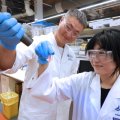Q-Sera Pty Ltd, the latest biotechnology company formed to commercialise intellectual property from The University of Queensland (UQ), has raised $900,000 from Australia’s Medical Research Commercialisation Fund (MRCF) and the Uniseed Commercialisation Fund to develop an improved blood collection tube.
The start-up company will develop technology for producing high quality serum in a clinical setting, based on the blood clotting properties of specific snake venom.
UniQuest, UQ’s main commercialisation company, negotiated an agreement between UQ, MRCF and Uniseed to licence the innovative serum production technology to Q-Sera, which is based on the research of Dr Martin Lavin from the UQ Centre for Clinical Research, Dr Paul Masci from the School of Medicine, and Emeritus Professor Dr John de Jersey from the School of Chemistry and Molecular Biosciences, and Dr Goce Dimeski.
“This investment is UQ’s first transaction with the MRCF, and 18th with Uniseed - that’s a powerful endorsement of UQ’s quality of translational research,” said UniQuest Managing Director, David Henderson, on the eve of the 2012 BIO International Convention.
“The Q-Sera deal also highlights the value that collaborations, between multi-disciplinary research teams and commercial funding bodies, can add to the efforts of Australian researchers working on innovative solutions to common clinical needs,” Mr Henderson said.
The Q-Sera technology aims to reduce the time required to produce high quality serum in blood clotting tubes, used in biochemical and other pathology assays and involves coating blood collection tubes with a naturally occurring coagulation agent, isolated from the venom of certain Australian snakes to accelerate the clotting of blood.
Serum is produced by allowing the blood to clot then applying centrifugation to separate the serum. Tubes currently used contain a clot activator, but they are unable to clot blood from some patients, e.g. cardiac patients taking anticoagulants such as warfarin or heparin. This limitation risks inaccurate clinical results and diagnosis.
The Q-Sera research has demonstrated successful clotting of such blood samples, providing a higher degree of confidence around patient diagnosis and patient care.
Uniseed CEO Dr Peter Devine said the opportunity to add yet another uniquely Australian discovery to its biotechnology investment portfolio was particularly appealing.
“The Q-Sera research has isolated an important class of proteins from certain Australian snakes that have the ability to rapidly clot blood in a blood collection tube. The species may be native to Australia but the impact of this technology is likely to be felt worldwide,” Dr Devine said.
MRCF Investment Manager Dr Bev Thomas said the opportunity to support Q-Sera reflected the Fund’s charter to foster best practice in the commercialisation of innovation and to support Australia’s emerging medical discoveries to generate returns for its investors.
“We immediately recognised the global application of the technology and its potential to improve diagnosis and ultimately patient outcomes.”
“In clinical settings, particularly where urgent test results are required, the wait for the analysis of serum can delay lifesaving treatment or cause errors in patient diagnosis. By investing in Q-Sera we are working to improve the process.”
No other terms of the agreement have been disclosed. However, as UniQuest represents a number of life sciences institutes that are members of the MRCF research community and the universities which founded Uniseed, the Q-Sera transaction is expected to help pave a promising path for future investment agreements with both funding bodies.
Postscript
The Q-Sera investment is one of several announcements from UniQuest coinciding with this year’s BIO (booth 3435). For more news, please visit www.uniquest.com.au/uniquest-news
Media enquiries:
UniQuest: Leanne Wyvill +61 7 3365 4037, 0409 767 199 or l.wyvill@uniquest.com.au
Uniseed: Peter Devine 0409 631 581 or p.devine@uniseed.com
MRCF: Bev Thomas 0419 519182 or bthomas@brandoncapital.com.au
About Q-Sera Pty Ltd
Q-Sera is a start-up company from the Centre for Clinical Research, The University of Queensland that will develop a new type of serum collection tube. The technology behind Q-Sera involves using a certain class of proteins from the venom of specific Australian snakes to accelerate the clotting of blood in an improved blood collection tube to produce high quality serum for biochemical analysis. The company is developing a prototype tube and proof-of-concept clinical study to demonstrate the superiority of the Q-Sera tube compared to the current commercial tubes in clotting blood from healthy volunteers and cardiac patients.
About UniQuest Pty Limited www.uniquest.com.au
Established by The University of Queensland in 1984, UniQuest is widely recognised as one of Australia’s largest and most successful university commercialisation groups, benchmarking in the top tier of technology transfer worldwide. From an intellectual property portfolio of 1500+ patents it has created over 70 companies, and since 2000 UniQuest and its start-ups have raised more than A$450 million to take university technologies to market. Annual sales of products using UQ technology and licensed by UniQuest are running at A$3 billion. UniQuest now commercialises innovations developed at The University of Queensland and its commercialisation partner institutions: the University of Wollongong, University of Technology Sydney, James Cook University, University of Tasmania, Mater Medical Research Institute, and Queensland Health. A recent addition to the company is the Queensland Government-supported ilab technology business incubator and accelerator. UniQuest also provides access to an expansive and exclusive network of independent academics to tailor a consulting or project R&D solution to meet the diverse needs of industry and government, facilitating some 500 consulting, expert opinion, testing, and contract research services each year. UniQuest is also a leading Australasian provider of international development assistance recognised for excellence in technical leadership, management and research. Working with agencies such as AusAID, NZAID, the Asian Development Bank and the World Bank, UniQuest has developed and implemented more than 400 projects in 60+ countries throughout the Pacific, South-East Asia, the Indian sub-continent and Africa.
About Uniseed www.uniseed.com
Uniseed is a $61 million commercialisation fund operating at the University of Queensland, New South Wales and Melbourne. Apart from these three universities, Australian Super, one of Australia’s largest superannuation funds, is also a member. Uniseed has made over 30 investments in technologies arising from its partner universities including Vintela (AVCAL Best Early Stage Deal 2005) and QRx-Pharma (largest biotech IPO in ASX history).
About The Medical Research Commercialisation Fund (MRCF) www.mrcf.com.au
The $51 million Medical Research Commercialisation Fund (MRCF) Collaboration is an innovative investment collaboration established in 2007 and managed by Brandon Capital Partners (www.brandoncapital.com.au). The MRCF invests in early stage development and commercialisation opportunities emanating from its membership of 32 Australian medical research institutes and allied research hospitals, that include the Centre for Clinical Research. The MRCF IIF, LP fund is supported by AustralianSuper, StatewideSuper and the Australian Government under its IIF program. The MRCF also acknowledges the support of the State governments of Victoria, New South Wales, Western Australia and Queensland.
.jpg)








